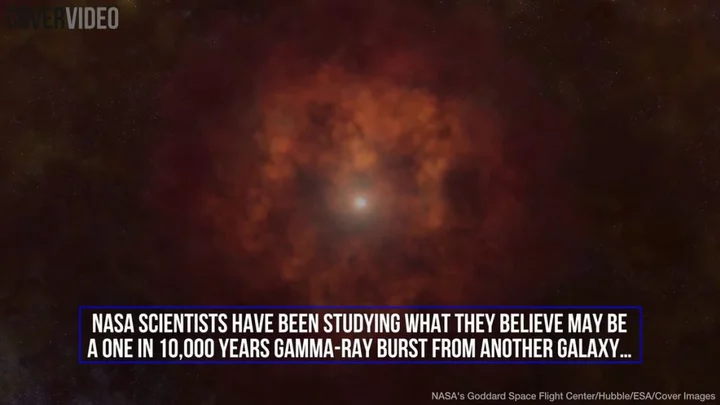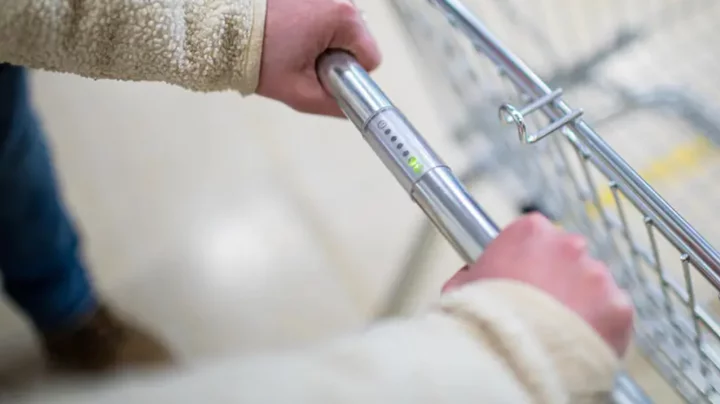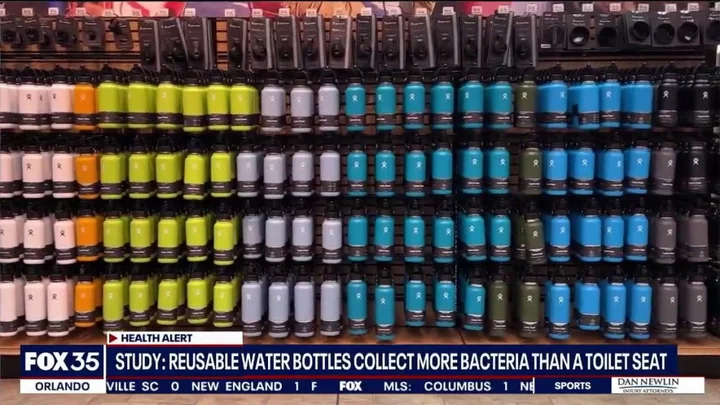
Crypto Firm Circle Eyeing Hong Kong Policies With Asia in Focus
US-based Circle Internet Financial Ltd. is closely watching regulatory developments in Hong Kong after the territory’s new crypto
2023-06-27 10:45

Analysis-Fever over BlackRock's bitcoin fund faces chill of rate hikes and regulations
By Elizabeth Howcroft LONDON BlackRock's plans for a bitcoin fund have helped push the world's largest cryptocurrency to
2023-06-26 20:49

New images show Chinese spy balloons over Asia
BBC Panorama worked with an artificial intelligence company to sift through millions of satellite pictures.
2023-06-26 19:27

Astronomers discover a totally new way that stars can die
Astronomers have discovered a new way that stars can die. In a study published in the journal Nature Astronomy, experts have worked out that a minute-long gamma-ray burst of light, which occured in 2019 and evidence a star dying, happened because stars collided within the densely crowded environment near the supermassive black hole at the centre of an ancient galaxy. Normally gamma-ray bursts (GRB) last around two seconds and happen when stars collapse. “For every hundred events that fit into the traditional classification scheme of gamma-ray bursts, there is at least one oddball that throws us for a loop,” said study coauthor Wen-fai Fong, assistant professor of physics and astronomy at Northwestern University’s Weinberg College of Arts and Sciences, in a statement. “However, it is these oddballs that tell us the most about the spectacular diversity of explosions that the universe is capable of.” Over time, astronomers have observed three main ways that stars can die, depending on their size. Lower mass stars like our sun shed their outer layers as they age, eventually becoming dead white dwarf stars. Sign up to our free Indy100 weekly newsletter Massive stars burn through the fuel-like elements at their core and shatter in explosions called supernovas. Doing so can leave behind dense remnants like neutron stars or result in the creation of black holes. A third form of star death results when neutron stars or black holes begin to orbit one another in a binary system and spiral closer to one another until they collide and explode. But the new observation suggests a fourth type of death. “Our results show that stars can meet their demise in some of the densest regions of the universe, where they can be driven to collide,” said lead study author Andrew Levan, an astrophysics professor at Radboud University in Nijmegen, Netherlands, in a statement. “This is exciting for understanding how stars die and for answering other questions, such as what unexpected sources might create gravitational waves that we could detect on Earth.” “The lack of a supernova accompanying the long GRB 191019A tells us that this burst is not a typical massive star collapse,” said study coauthor Jillian Rastinejad, a doctoral student of astronomy at Northwestern, in a statement. “The location of GRB 191019A, embedded in the nucleus of the host galaxy, teases a predicted but not yet evidenced theory for how gravitational-wave emitting sources might form.” “While this event is the first of its kind to be discovered, it’s possible there are more out there that are hidden by the large amounts of dust close to their galaxies,” said Fong, who is also a member of the Center for Interdisciplinary Exploration and Research in Astrophysics at Northwestern. “Indeed, if this long-duration event came from merging compact objects, it contributes to the growing population of GRBs that defies our traditional classifications.” You learn something new every day. Have your say in our news democracy. Click the upvote icon at the top of the page to help raise this article through the indy100 rankings.
2023-06-26 19:27

India's Infosys signs $454-million deal with Danske Bank
BENGALURU (Reuters) -Infosys, India's No.2 IT services provider, signed a $454-million contract with Denmark's Danske Bank on Monday, at a
2023-06-26 15:21

Scientists have come up with a new meaning of life – and it's pretty mind-blowing
The meaning of life is the ultimate mystery – why do we exist? And is there a point to… well… anything? These are questions to which we may never find answers, but at least we can define what “life” means in scientific terms. And yet, our understanding of what life is is changing all the time, thanks to space exploration. As scientists continue to hunt for life beyond our own world, biologists are having to rethink the meaning of the word “life” itself. Sign up for our free Indy100 weekly newsletter Generally, biologists explain “life” as connoting a self-sustaining chemical system which is capable of performing functions such as eating, metabolising, excreting, breathing, moving, growing, reproducing, and responding to external stimuli. This definition works pretty well here on Earth (although there are some important exceptions, such as viruses), but experts have pointed out that if life exists elsewhere in the universe, it may not display the same properties that we’re used to. Indeed, it might be unrecognisable as life as we know it (forget those little green men). In which case, how will we spot it if it ever crosses our path? Astrobiologist Sara Imari Walker and chemist Lee Cronin think they’ve come up with a solution. The pair are now arguing that highly complex molecules found in all living creatures can’t exist thanks purely to chance. Therefore, they say, the universe must have a way of creating and reproducing complex information and retaining a “memory” of all of this.. In an interview with New Scientist, Walker, of Arizona State University, explained their radical idea on how objects come into existence. The concept, known as Assembly Theory, explains why certain complex objects have become more abundant than others by considering their histories. If the theory proves correct, it will redefine what we mean by “living” things and show that we’ve been going about the search for extraterrestrial life all wrong. In the process, we could even end up creating alien life in a laboratory, she stressed. In her discussion with New Scientist, Walker pointed out: "An electron can be made anywhere in the universe and has no history. You are also a fundamental object, but with a lot of historical dependency. You might want to cite your age counting back to when you were born, but parts of you are billions of years older. "From this perspective, we should think of ourselves as lineages of propagating information that temporarily finds itself aggregated in an individual." Assembly theory predicts that molecules produced by biological processes must be more complex than those produced by non-biological processes, as Science Alert notes. To test this, Walker and her team analysed a range of organic and inorganic compounds from around the world and outer space, including E. coli bacteria, urine, meteorites and even home-brewed beer. They then smashed up the compounds into smaller pieces and used mass spectrometry to pinpoint their molecular building blocks. They calculated that the smallest number of steps required to reassemble each compound from these building blocks was 15. And whilst some compounds from living systems needed fewer than 15 assembly steps, no inorganic compounds made it above this threshold. "Our system … allows us to search the universe agnostically for evidence of what life does rather than attempting to define what life is," Walker, Cronin, and others wrote in a 2021 Nature Communications article. The handy thing about this building block system – which they’ve dubbed the “'molecular assembly index” – is that it doesn’t rely on carbon-based organic materials to be identified. In other words, an alien could be made of entirely different stuff entirely and we’d still be able to spot it as life using the index. It also works regardless of what stage of “life” an extraterrestrial being is in – whether it is still in its infancy or has moved into a technological stage beyond our understanding. That’s because all of these states produce complex molecules which couldn’t exist in the absence of a living system. If all of this is hurting your head, let’s just get back to the basics: if there is a secret to life, it might all be down to what we do, not what we are. Have your say in our news democracy. Click the upvote icon at the top of the page to help raise this article through the indy100 rankings.
2023-06-25 19:50

Heartbeat sensors on shopping trolleys 'could save lives', new study suggests
New findings have suggested that adding sensors to supermarket trolleys could save people’s lives. Scientists investigated whether installing electrocardiogram (ECG) sensors – designed to check the heart’s rhythm – on the handles of supermarket, trolleys could identify shoppers with atrial fibrillation, which causes an irregular and often abnormally fast heart rate. The sensors would detect heart conditions that put them at increased risk of stroke. The researchers said that over the course of two months, they identified 39 people who were unaware that they had the condition. Ian Jones, professor of cardiovascular nursing at Liverpool John Moores University, who led the study, said: “That’s 39 people at greater risk of stroke who received a cardiologist appointment.” He added: “This study shows the potential of taking health checks to the masses without disrupting daily routines.” It is estimated that around 1.5 million people in the UK have atrial fibrillation, contributing to one in five strokes. The condition is treatable, but at least another 270,000 people in the UK remain undiagnosed and unaware, according to the British Heart Foundation. Sign up for our free Indy100 weekly newsletter There are wearable devices that can also spot irregular heartbeat but this would also require people to take responsibility and wear the device. Professor Jones said: “Nearly two-thirds of the shoppers we approached were happy to use a trolley, and the vast majority of those who declined were in a rush rather than wary of being monitored. “This shows that the concept is acceptable to most people and worth testing in a larger study.” He added: “Checking for atrial fibrillation while people do their regular shopping holds promise for preventing strokes and saving lives. “A crucial aspect is providing immediate access to a health professional who can explain the findings and refer patients on for confirmatory tests and medication if needed.” The findings were presented at ACNAP 2023 conference organised by the European Society of Cardiology (ESC). Have your say in our news democracy. Click the upvote icon at the top of the page to help raise this article through the indy100 rankings.
2023-06-25 16:46

Reusable bottles contain 'more bacteria than toilet seats'
Reusable water bottles tick many boxes. Not only do they help you stay hydrated and help save money, but they also help cut down on single-use plastic. They've almost become a fashion accessory, with chic stainless steel flasks and viral bottles going viral across TikTok. Sign up for our free Indy100 weekly newsletter Trying to hit the NHS-recommended eight glasses of water a day for adults is an excellent idea, of course, but did you know there’s one way your refillable bottle could potentially be detrimental to your health? According to a study from waterfilterguru.com, reusable water bottles contain an average of 20.8m colony-forming units (CFUs) of bacteria, which equates to 40,000 times more than the microbes on a toilet seat. So what might be the consequences if you continuously sip and refill without washing your bottle properly between uses? We asked health experts to talk through the risks… Bottling up bacteria “A common misconception when it comes to reusable water bottle hygiene is that as you’re typically filling it with pure water and it’s only coming into contact with your own mouth, there’s little need to clean it often,” says Dr Donald Grant, senior clinician at The Independent Pharmacy. However, every time you drink from the bottle, you’re transferring bacteria from your mouth, which can then multiply in the container. “Anything that is reusable can be prone to accumulating dirt, dust or debris and, as a result, bacteria,” says private GP Dr Suhail Hussain. “This is exacerbated by the fact water bottles are the ideal environment for harbouring bacteria due to being moist.” Hard-to-reach crevices – for example, inside a screw top or under a flip-up straw – could also develop mould, and then there’s contamination from other sources. “When you store it in a gym bag, for instance, it can pick up bacteria from the interior of the bag or anything else stored in it, while you can also transfer bacteria from your hands to your bottle,” says Grant. “If your bottle has a valve cap, you may need to lift or twist it with your fingers, and this can transfer bacteria you may have picked up from touching other objects or surfaces.” What types of microbes are found in water bottles? “These might be simple commensals such as streptococcus and staphylococcus, which normally live in symbiosis with their host (i.e. us) but can become problematic if they accumulate or the individual is under the weather,” Hussain says. “Bacteria such as E. coli – a common cause of urine and bowel infections – can often colonise the water bottle following repeated handling, such as taking the cap on and off.” These bacteria can potentially cause a variety of issues. “You may become sick and develop gastric illness, such as diarrhoea or vomiting,” Hussain continues. “Gram negative rods – another common bacterium found in unwashed bottles – can lead to urogenital tract infections and pneumonia.” Grant warns: “If there’s a build-up of mould inside the bottle, this can cause allergy symptoms, such as a runny nose, sneezing, or red and itchy eyes. Symptoms might be more severe for someone with asthma.” How often should you wash your reusable water bottle? “To minimise your risk of getting sick, you should ideally clean your water bottle after each use,” Grant says. “As a minimum, you should aim to wash it thoroughly at least a few times a week.” Hot water and washing up liquid are all you need to banish bacteria on a daily. “Fill the bottle with hot soapy mixture and swill around, or leave to soak in a detergent mixture,” Hussain advises. “Remember to pay special attention to lids/caps and screw top regions – use a clean brush [to scrub them].” If you’ve neglected your bottle for a few days and it needs a deeper clean, Grant suggests: “Soak your bottle overnight in a solution of half vinegar and half water. Rinse the bottle and let it dry fully before using it again.” Storage is also important to help minimise nasty microbes. “Where possible, you should keep your water bottle out of germ-rich environments such as your gym locker or sports bag,” Grant says. “You should also avoid filling your bottle with anything other than water, such as protein shakes, energy drinks, or sugar-rich liquids, as sugar can stimulate the growth of bacteria.” Hussain adds: “Don’t leave a water bottle in the sun for long periods or sitting in the cup holder in the car – the mixture of warmth and moisture is likely to make bacterial overgrowth worse.” Have your say in our news democracy. Click the upvote icon at the top of the page to help raise this article through the indy100 rankings.
2023-06-24 17:21

Nvidia CEO Says Chipmaker ‘Extremely Likely’ to Invest in Europe
Nvidia Corp., the world’s most valuable chipmaker, is “extremely likely” to invest in Europe, Chief Executive Officer Jensen
2023-06-24 09:22

Binance ordered to stop all digital currency services in Belgium
By Sudip Kar-Gupta BRUSSELS Belgium's FSMA regulator on Friday ordered Binance to cease offering any virtual currency services
2023-06-24 01:51

EU Warns Twitter Must Bolster Resources Ahead of Elections
Elon Musk’s Twitter needs to put more resources toward addressing sensitive content if it wants to comply with
2023-06-23 12:47

Malaysia to take legal action against Meta, says harmful content not removed
KUALA LUMPUR (Reuters) -Malaysian authorities said on Friday they will take legal action against Facebook parent company Meta Platforms for
2023-06-23 10:57
